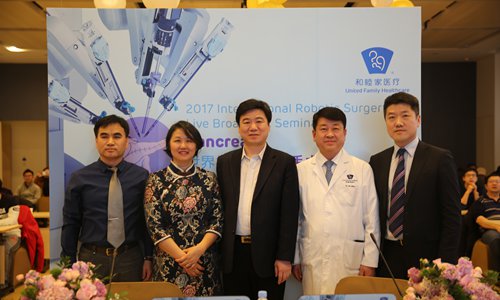
Liu Rong (center) with other guests at the recent 2017 International Robotic Surgery Live Broadcast Seminar Photo: Courtesy of BJU
Liu Rong, the chief of the Second Department of Hepato-Pancreatico-Biliary (HPB) Oncology Surgery at the Chinese People's Liberation Army General Hospital in Beijing, has livestreamed the world's first global broadcast of a da Vinci robot-assisted pancreatic surgery.
"HPB surgery is one of the most difficult among all the abdominal surgeries, and using the robot-assisted surgical system can help make it easier and reduce many complications," said Liu during the 2017 International Robotic Surgery Live Broadcast Seminar held at Beijing United Family Hospital (BJU) on December 28.
He was also made a chief expert in the HPB surgery department at BJU during the event. Many robotic surgery experts from European and American countries, Japan, South Korea, India and China watched the live broadcast remotely and discussed the procedure online.
Liu performed a pancreatic duodectomy using the da Vinci Surgical System from US company Intuitive Surgical. The operation took him less than four hours.
"Our department has done the most robotic HPB operations in the world," he said. "Since we introduced the da Vinci Surgical System in 2011, we have done 1,800 robotic HPB operations, almost a quarter of all the robotic HPB operations in China."
As hospitals gain more support from the government and Chinese patients and their families become more aware of the advantages of robotic HPB operations, the number of HPB operations using the da Vinci Surgical System has steadily increased, said Liu.
According to the 2017 China report on the status and trends of cancer, pancreatic cancer is the sixth highest cause of death among male cancer patients and the seventh highest among females. Pancreatic cancer morbidity increases every year.
"Many surgeons are afraid to do traditional open pancreatic surgeries due to its great technical difficulty and high post-operation risks, including surgical trauma, many complications and a relatively high death rate," said Liu.
"With the advanced da Vinci Surgical System, patients recover more quickly. For example, they can get up and move around seven days after the operation, which was unimaginable before."
He said the robot gives the doctor a clearer and more magnified view of the internal organs and allows them to repair tiny blood vessels in a narrow space. In this sense, it is safer than traditional open pancreatic cancer surgeries.
Liu thinks that it is important to improve academic discourse and training in robot-assisted HPB operations among medical professionals so that it can be used in more hospitals in China.
"I believe that with the increase in the number of robot-assisted surgeries and a reduction in the cost of the equipment, the da Vinci Surgical System will be more widely used," said Liu.
Since May 2016, BJU has livestreamed several da Vinci robotic surgeries to advance international academic discourse and increase public awareness.
BJU general manager Pan Zhongying said the hospital has been using the da Vinci Surgical System in more and more minimally invasive operations and that its post-operation results have also won increasing recognition and satisfaction from patients.
The hospital has hired a dozen top experts from first-rate public hospitals, including Peking University Tumor Hospital to conduct such surgeries. BJU also has both the highly-experienced team of surgeons and advanced technology to carry out complicated operations for many types of diseases.
